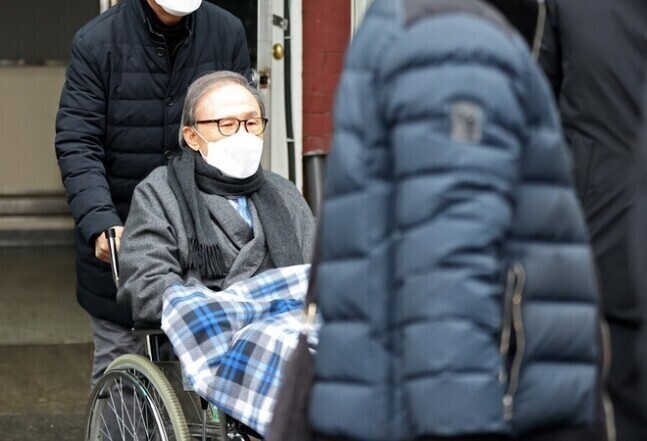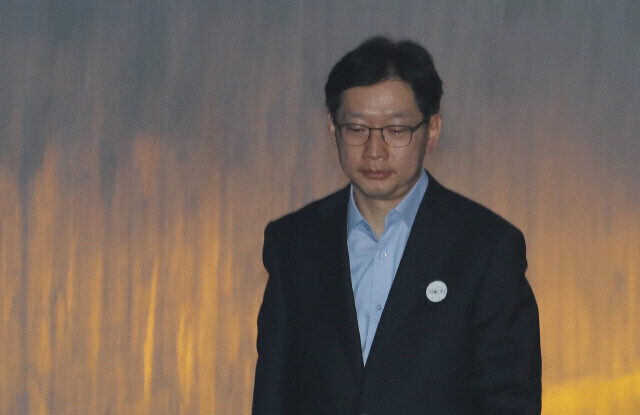hankyoreh
Links to other country sites 다른 나라 사이트 링크
Names floated for Yoon’s special pardons lack balance, standard

As speculation and interest mounts surrounding who will be the recipients of South Korean President Yoon Suk-yeol’s second set of special pardons, politicians are raising a debate over whether the representation in terms of positions, crimes and sentences aligns with the purported justification of achieving “national unity.”
Many critics derided the show of “token unity” as the administration threw in a few opposition figures whose crimes were relatively minor or whose sentences were already coming to an end, while pardoning and reinstating numerous ruling party figures who enlisted state institutions to commit serious crimes under past conservative administrations.
At a Cabinet meeting on Jan. 27, Yoon is set to finalize the list of pardon recipients as reviewed and reported by the Ministry of Justice pardon review committee last Friday.
Many of the pardon recipients reported to Yoon by Justice Minister Han Dong-hoon were high-ranking government officials convicted of crimes during the Lee Myung-bak and Park Geun-hye administrations.
Collectively, the sentences for nine of the major pardon candidates — including a former president, presidential chief of staff, senior secretary for civil affairs, senior secretary for political affairs, and National Intelligence Service (NIS) chief — amount to 50 years and six months.
Former President Lee Myung-bak, who was included on the list of pardon recipients, received a final 17-year prison sentence on charges including bribery and embezzlement. The charges in question are seen as more serious than those against Park Geun-hye — another former president who ended up in prison — since they involved personal improprieties.
Enforcement of Lee’s sentence was suspended in June. To date, he has only spent around 950 days in prison, or 15.5% of his sentence. If his pardon is finalized, he will be off the hook for the remaining 14 years and six months.
Won Sei-hoon, the former NIS director who ordered the enlistment of his agency in manipulating public opinion during an election under Lee’s administration, was also reportedly included on the list of pardon candidates after being handed a final sentence of 14 years and two months, which included other criminal charges. He has currently served 50.5% of his sentence.
Others on the list reportedly included Choi Kyoung-hwan, the former deputy prime minister who was paroled in March after receiving a five-year prison sentence for accepting NIS “special activity funds” during the Park administration.
Nam Jae-joon, Lee Byeong-gi Lee Byung-ho, who respectively received sentences of five years, three years, and three years and six months for paying NIS special activity funds to Park, make up three more names on the list.
Kim Ki-chun, who was Park Geun-hye’s presidential chief of staff, and Cho Yoon-sun, a former Blue House senior secretary for political affairs, respectively received sentences of one year and 10 months (suspended for two years) for ordering selective support to conservative groups are being considered for pardons as well.
Finally, Woo Byung-woo, the former Blue House senior secretary for civil affairs who received a one-year sentence in connection with the use of the NIS for illegal surveillance of government officials has been floated as a recipient.
If these nine figures do receive special pardons, they will all have been essentially freed and reinstated by the same Yoon Suk-yeol who was responsible for investigating them or directing their investigations during his time as a prosecutor.

In contrast, the opposition figures named to date as potential pardon recipients all have positions and crimes that are minor in comparison.
One figure whose potential pardon the opposition has been playing up as a gesture toward “national unity” is former South Gyeongsang Gov. Kim Kyoung-soo, who received a final two-year sentence in 2017 on charges of manipulating internet posts during a presidential election.
But with Kim’s release date scheduled for May 2023, he has already served 81.9% of his sentence.
Other figures convicted of personal improprieties who were reportedly added as a gesture toward “opposition balance” include Jun Byung-hun, the former Blue House senior secretary for political affairs who was sentenced to one year in prison suspended for two years on bribery charges and eight months in prison suspended for two years on embezzlement charges.
Shin Geh-ryeun, the former Democratic Party lawmaker who was sentenced to one year for illegal lobbying, has been floated for a pardon.
Finally, Gang Woon-tae, the former Gwangju mayor who was sentenced to one year suspended for two years for unlawful early election campaign activities, has been referenced as a unity candidate for pardon.
Including Kim, their collective sentences add up to just five years and eight months.
By Kim Hae-jeong, staff reporter
Please direct questions or comments to [english@hani.co.kr]

Editorial・opinion
![[Editorial] Intensifying US-China rivalry means Seoul must address uncertainty with Beijing sooner than later [Editorial] Intensifying US-China rivalry means Seoul must address uncertainty with Beijing sooner than later](https://flexible.img.hani.co.kr/flexible/normal/500/300/imgdb/original/2024/0517/8117159322045222.jpg) [Editorial] Intensifying US-China rivalry means Seoul must address uncertainty with Beijing sooner than later
[Editorial] Intensifying US-China rivalry means Seoul must address uncertainty with Beijing sooner than later![[Column] When ‘fairness’ means hate and violence [Column] When ‘fairness’ means hate and violence](https://flexible.img.hani.co.kr/flexible/normal/500/300/imgdb/original/2024/0516/7417158465908824.jpg) [Column] When ‘fairness’ means hate and violence
[Column] When ‘fairness’ means hate and violence- [Editorial] Yoon must stop abusing authority to shield himself from investigation
- [Column] US troop withdrawal from Korea could be the Acheson Line all over
- [Column] How to win back readers who’ve turned to YouTube for news
- [Column] Welcome to the president’s pity party
- [Editorial] Korea must respond firmly to Japan’s attempt to usurp Line
- [Editorial] Transfers of prosecutors investigating Korea’s first lady send chilling message
- [Column] Will Seoul’s ties with Moscow really recover on their own?
- [Column] Samsung’s ‘lost decade’ and Lee Jae-yong’s mismatched chopsticks
Most viewed articles
- 1[Editorial] Transfers of prosecutors investigating Korea’s first lady send chilling message
- 2[Column] US troop withdrawal from Korea could be the Acheson Line all over
- 3[Exclusive] Unearthed memo suggests Gwangju Uprising missing may have been cremated
- 4Xi, Putin ‘oppose acts of military intimidation’ against N. Korea by US in joint statement
- 5‘Shot, stabbed, piled on a truck’: Mystery of missing dead at Gwangju Prison
- 6[Column] When ‘fairness’ means hate and violence
- 7Spotlight turns to Hyundai Group Chairwoman’s visit to North Korea
- 8[Column] Samsung’s ‘lost decade’ and Lee Jae-yong’s mismatched chopsticks
- 9[Column] Will Seoul’s ties with Moscow really recover on their own?
- 10[Editorial] Intensifying US-China rivalry means Seoul must address uncertainty with Beijing sooner t